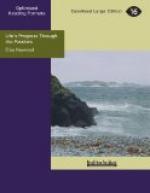He said many other tender and gallant things to her, in order to engage her to add her commands to those of the abbess; but, either the belief that he was wholly devoted to that lady, or the natural reserve of her temper, would suffer her to let him draw no more from her, than that she should share in the happiness her sister proposed to herself, in his continuing so near them.
But tho’ Elgidia could command her words, she could not have so much power over her eyes as to keep them from betraying a tenderness not inferior to that of her sister; and Natura had the satisfaction of finding he was beloved by both these amiable women, without thinking himself so far attached to either, as not to be able to break off whenever he pleased.
But to what end tended all this gallantry! to what purpose was all this waste of time, in an amour, which either had no aim in view, or if it had, must be such a one, as must turn to the confusion of the persons concerned in it!—These indeed are questions any one might naturally ask, but could not have been resolved by Natura, who took a pleasure in prosecuting the adventure, and neither examined what he proposed by it himself, or considered what consequences might ensue; and herein he but acted as most others do of his age, who rarely give themselves the pains of consulting what may, or will be, when pleased with what is.
He went to the place the abbess had directed, but imagined he should be very much at a loss for amusement, being wholly a stranger to every body. He would doubtless have been so, had his retreat been in any other country than France; but as it is the peculiar characteristic of that nation to entertain at first sight with the same freedom and communicativeness of a long acquaintance, he soon found himself neither without company nor diversion:—whether he had an inclination to hunt, or dance, or play, he always met with persons ready to join in the party, so that the intervals he passed there, between his visits to the monastery, seemed not at all tedious to him.
The ladies, however, were far from being forgotten by him; ten days had not elapsed, before he returned to renew, or rather to improve, the impression he had both given and received.—The abbess appeared all life and spirit at his return, but Elgidia was more melancholly than when he left her; but it was a melancholly which had in it somewhat of a soft languor, which was very engaging to Natura, especially as he had reason to believe, by several looks and expressions, which in some unguarded moments fell from her, that he had the greatest interest in it.
The oftener he saw her, the more he was confirmed in this conjecture; but as he could not be assured of it, never treated her in a manner which should give her room to guess what his thoughts were, for fear of meeting with a rebuff, which would have been too mortifying to his vanity:—but as the belief of being beloved by her, rendered her insensibly more dear to him; the regards he paid her, and the sighs which frequently issued from his breast when he approached her, did not escape the notice of the quick-sighted abbess; and disdaining a competitorship in a heart she thought she had wholly engrossed, resolved to be more plain than hitherto she had been, in order to bring him to declare himself.




